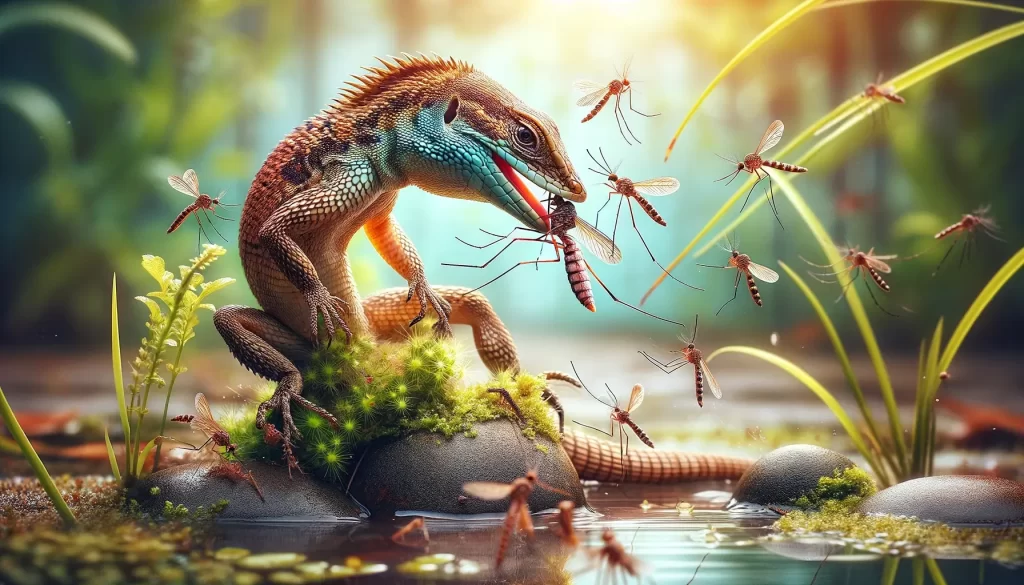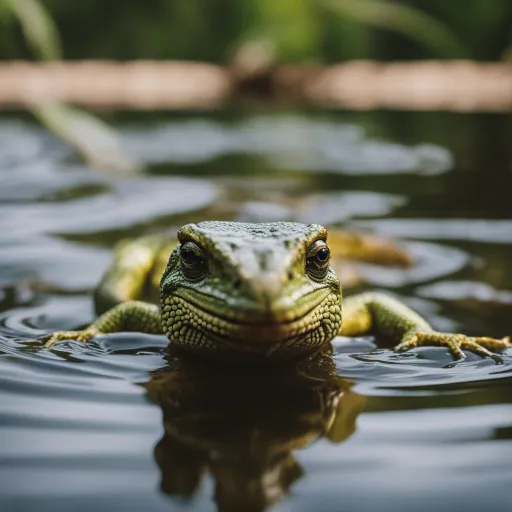Picture this: it’s a warm summer evening, and you’re relaxing on your porch, sipping on a refreshing drink.
Suddenly, you notice a high-pitched buzzing sound, followed by the all-too-familiar feeling of a mosquito bite.
Irritated, you wonder why these pesky insects seem to be multiplying every year. As it turns out, there may be a reptilian hero lurking in your backyard – lizards.
Yes, you read that right. In this article, we’ll explore the fascinating role of lizards in controlling mosquito populations and how they might just be nature’s secret weapon in the ongoing battle against these bloodsucking pests.
Lizards play a significant role in controlling mosquito populations by preying on them, thus acting as natural pest controllers. Their diet often includes various insects, including mosquitoes, which helps in reducing the number of these pests in environments where lizards are present.
Introduction
Controlling mosquito populations is an essential aspect of maintaining public health and preventing the spread of diseases.
Mosquitoes are notorious for transmitting various illnesses such as malaria, dengue fever, and Zika virus, posing a significant threat to human populations.
While the use of insecticides and other mosquito control methods is common, an alternative and natural approach to reducing mosquito populations is by relying on lizards as natural predators.
In this article, we will explore the benefits of using lizards for mosquito control, factors affecting their impact, how to encourage lizard populations, potential limitations and challenges, ongoing research, and the importance of complementary mosquito control measures.
Benefits of Controlling Mosquito Populations
Prevention of Disease Transmission
Mosquitoes act as vectors for numerous diseases, transmitting harmful pathogens from person to person.
By reducing mosquito populations, there is a direct decrease in the risk of disease transmission.
This is especially crucial in regions where mosquito-borne illnesses are prevalent.
By controlling mosquitoes, we can significantly mitigate the outbreak of diseases and safeguard public health.
Reduction in Mosquito-Borne Illnesses
Controlling mosquito populations not only prevents disease transmission but also directly reduces the prevalence of mosquito-borne illnesses.
These illnesses impose a huge burden on healthcare systems and cause immense suffering among affected individuals.
By curbing mosquito populations, we can effectively decrease the number of cases and alleviate the strain on healthcare resources, ultimately leading to the improvement of communities’ well-being.
Lizards as Natural Predators
Types of Lizards that Consume Mosquitoes
Several lizard species exhibit a natural inclination towards consuming mosquitoes and their larvae.
Geckos, anoles, skinks, and certain species of chameleons and iguanas are well-known for their feeding habits that include mosquitoes.
These lizards actively hunt and feed on mosquitoes, making them potential allies in mosquito control efforts.
Lizards’ Feeding Habits
Lizards have developed specialized jaws and teeth that enable them to capture and consume mosquitoes with relative ease.
Many lizard species are nocturnal, which coincides with mosquitoes’ peak activity times.
They use their excellent eyesight and agility to catch mosquitoes in flight or hunt them in areas where they are abundant, such as stagnant water bodies.
Lizards also play a crucial role in controlling mosquito larvae since they often reside in areas where these larvae hatch, such as ponds, puddles, and other water sources.
Effectiveness in Controlling Mosquito Populations
While lizards alone may not entirely eradicate mosquito populations, they play a valuable role in reducing their numbers.
In areas where lizards are abundant, their predation significantly suppresses mosquito populations, leading to a noticeable decrease in the frequency of mosquito-borne illnesses.
Lizards’ presence can create a natural balance that helps keep mosquito populations in check, particularly in residential areas where chemical control methods may not be viable or desired.
Factors Affecting Lizards’ Impact on Mosquitoes
Climate and Habitat Suitability
Lizards are affected by the prevailing climate and habitat conditions in their environment.
In regions with extreme temperatures, such as cold winters or scorching summers, lizard populations may diminish or become inactive, impacting their ability to control mosquitoes.
Additionally, suitable habitats for lizards, such as dense vegetation, rocks, and fallen logs, contribute to their population density and effectiveness as mosquito predators.
Availability of Alternative Food Sources
While lizards readily consume mosquitoes, their diet often extends beyond these insects.
The availability of alternative food sources, such as other insects and small invertebrates, can influence the impact of lizards on mosquito populations.
If their primary prey becomes scarce, lizards may shift their focus to other food sources, potentially reducing their predation on mosquitoes.
Thus, maintaining a diverse insect population alongside mosquitoes is crucial to sustain lizard populations as effective mosquito controllers.
Predation on Lizards
Predators of lizards, such as birds, snakes, and domestic cats, can pose a significant threat to lizard populations.
When lizard populations are at risk, their ability to control mosquitoes declines. Minimizing predation risk and providing safe habitats for lizards becomes essential to ensure their ongoing impact on mosquito populations.
Encouraging Lizard Populations
Creating Lizard-Friendly Habitats
To encourage lizard populations and enhance their natural predator role, it is vital to create lizard-friendly habitats.
This can be achieved by incorporating elements that attract and support lizards, such as providing rocks, logs, and dense vegetation.
Offering suitable areas for nesting, basking, and hiding will incentivize lizards to thrive in a particular location, increasing their potential to control mosquitoes effectively.
Limiting Pesticide Use
Excessive pesticide use can have detrimental effects on lizard populations. Pesticides may directly harm lizards or indirectly impact their prey, leading to a decline in their numbers.
Limiting the use of chemical pesticides and adopting alternative pest control methods can help preserve and encourage lizard populations.
Employing integrated pest management strategies that focus on targeted and minimal pesticide application can effectively reduce mosquito populations without harming beneficial lizard species.
Providing Water Sources
Lizards require access to water for hydration and reproduction. By providing small water sources such as birdbaths, shallow dishes, or even small ponds, we can attract lizards to our surroundings.
This will not only contribute to their overall well-being but also provide an environment with an ample mosquito population that lizards can feed on.
As water sources are critical for both lizards and mosquitoes, their proper management is essential to ensure a balance between the two.
Potential Limitations and Challenges
Lizard Predation on Beneficial Insects
While lizards are beneficial in controlling mosquito populations, they are generalist predators and may consume other insects that play important ecological roles.
Lizards might inadvertently prey upon beneficial insects, such as pollinators or pest predators, which could have unintended consequences for ecosystems.
It is essential to consider the ecological impact of encouraging lizard populations, ensuring that their increased presence does not disrupt the delicate balance of other essential insect species.
Risk of Lizards Becoming Pests
In certain scenarios, an overabundance of lizards can result in localized problems.
If their population growth is not regulated, lizards can multiply rapidly and become a nuisance to humans.
They might invade homes, damage property, or create unhygienic conditions. Therefore, careful monitoring and management of lizard populations are necessary to prevent them from becoming pests themselves.
Limited Control in Large Areas
While lizards can efficiently control mosquitoes in smaller areas, such as residential neighborhoods or garden spaces, their impact may be limited in larger areas.
Controlling mosquito populations in vast regions with diverse habitats poses numerous challenges, and relying solely on lizards may not be sufficient.
Hence, a comprehensive approach to mosquito control, including other measures and strategies, is necessary for effective management on a larger scale.
Research and Studies on Lizards’ Role
Field Observations
Researchers have conducted extensive field observations to study the impact of lizard populations on mosquito control.
These observations involve monitoring lizard behavior, diet analysis, and quantifying the reduction in mosquito populations in areas inhabited by lizards.
Field studies contribute valuable data that enhance our understanding of the ecological interactions between lizards and mosquitoes, providing insights into the effectiveness of lizards as natural predators.
Experimental Studies
To further investigate the relationship between lizards and mosquitoes, experimental studies have been conducted in controlled environments.
These studies manipulate lizard populations and measure their impact on mosquito numbers.
By altering variables such as lizard density and habitat conditions, researchers gain insights into the factors affecting the effectiveness of lizards in mosquito control.
Experimental studies contribute valuable information that can inform management strategies and optimize the use of lizards as natural predators.
Population Monitoring
Long-term population monitoring of both lizards and mosquitoes allows researchers to assess the dynamics between the two.
By studying population trends, researchers can analyze how changes in lizard populations affect mosquito populations and vice versa.
Population monitoring provides a comprehensive understanding of the long-term implications of using lizards for mosquito control, helping us identify strategies for optimal mosquito management.
Complementary Mosquito Control Measures
Integrated Pest Management Strategies
While lizards offer a natural approach to mosquito control, it is important to employ a variety of methods in a comprehensive approach known as integrated pest management (IPM).
IPM combines multiple strategies, including the use of chemical control, insect traps, larval source management, and cultural practices to target mosquito populations.
By integrating lizard populations into IPM strategies, their role can be maximized, effectively reducing the reliance on chemical pesticides and enhancing the overall effectiveness of mosquito control programs.
Introduction of Natural Predators
In addition to lizards, other natural predators of mosquitoes, such as bats, dragonflies, and certain bird species, can be introduced to complement mosquito control efforts.
By promoting diverse predator communities, we enhance the overall efficacy of mosquito control while minimizing the negative ecological consequences that can arise from relying solely on a single predator species.
A balanced predator-prey relationship stimulates a healthy ecosystem and sustainable mosquito management.
Cooperation with Lizards’ Role
To fully harness the potential of lizards as natural mosquito controllers, cooperation from individuals and communities is vital.
Adopting practices that encourage lizard populations, such as creating lizard-friendly habitats and reducing pesticide use, is crucial.
Additionally, spreading awareness about the importance of lizards’ role in mosquito control can strengthen public support for lizard conservation efforts.
By actively engaging with and supporting lizard populations, we can establish a harmonious coexistence that benefits both humans and the environment.
Final Thoughts
Controlling mosquito populations is a critical aspect of safeguarding public health, and lizards offer a natural and environmentally friendly method to achieve this.
By consuming mosquitoes and their larvae, lizards contribute to reducing mosquito-borne illnesses and creating a healthier living environment.
However, several factors, such as climate suitability, adequate food sources, and predation risks, influence the effectiveness of lizard populations in mosquito control.
Encouraging lizard populations through suitable habitats, limited pesticide use, and provision of water sources can enhance their role as mosquito predators.
Ongoing research and monitoring further refine our understanding of lizards’ impact on mosquitoes, enabling us to develop comprehensive strategies for sustainable mosquito management.
By integrating lizard populations into complementary mosquito control measures and promoting their coexistence, we can maximize the benefits of their natural predator role, ultimately improving public health and the balance of ecosystems.
Frequently Asked Questions
Q: What is the relationship between a lizard and a mosquito?
A: The relationship between a lizard and a mosquito is predominantly predator-prey, with lizards often preying on mosquitoes as a part of their insectivorous diet.
Q: What is the role of a lizard in the ecosystem?
A: Lizards play a critical role in ecosystems as both predators and prey. They help control insect populations, including pests, and serve as a food source for larger predators.
Q: Are lizards good for pest control?
A: Yes, lizards are beneficial for natural pest control as they consume a variety of insects, including mosquitoes, flies, and ants, reducing the need for chemical pesticides.
Q: How do lizards catch insects?
A: Lizards catch insects using their quick reflexes and agile movements. Some species also use their sticky tongues to capture prey.
Q: Do lizards eat mosquitoes?
A: Yes, many lizard species eat mosquitoes as part of their diet, helping to control mosquito populations in their habitats.
Q: Do mosquitoes feed on lizards?
A: Mosquitoes primarily feed on the blood of mammals and birds. While it’s less common, some mosquito species might feed on reptiles, including lizards, if given the opportunity.




